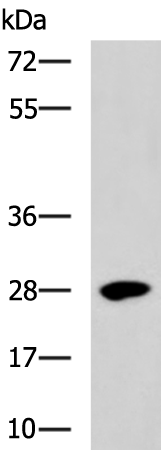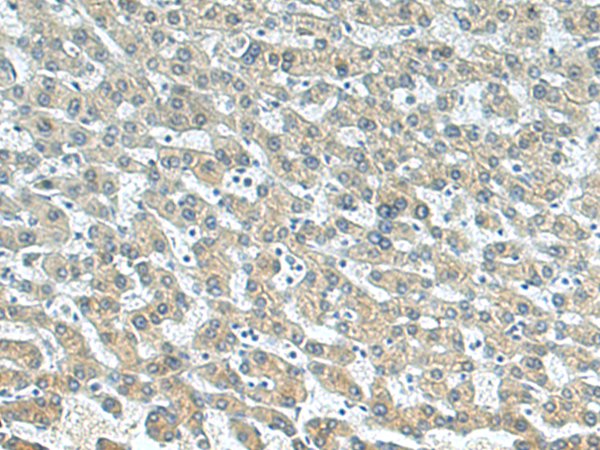

| WB | 咨询技术 | Human,Mouse,Rat |
| IF | 咨询技术 | Human,Mouse,Rat |
| IHC | 1/100-1/200 | Human,Mouse,Rat |
| ICC | 技术咨询 | Human,Mouse,Rat |
| FCM | 咨询技术 | Human,Mouse,Rat |
| Elisa | 1/5000-1/10000 | Human,Mouse,Rat |
| Aliases | ANA; TOB5; TOFA; APRO4; TOB55; ANA/BTG3 |
| WB Predicted band size | 29 kDa |
| Host/Isotype | Rabbit IgG |
| Antibody Type | Primary antibody |
| Storage | Store at 4°C short term. Aliquot and store at -20°C long term. Avoid freeze/thaw cycles. |
| Species Reactivity | Human, Mouse |
| Immunogen | Fusion protein of human BTG3 |
| Formulation | Purified antibody in PBS with 0.05% sodium azide and 50% glycerol. |
+ +
以下是关于BTG3抗体的3篇示例参考文献(注:以下内容为模拟示例,实际文献需通过学术数据库核实):
---
1. **文献名称**: *BTG3 suppresses colorectal cancer metastasis by inhibiting epithelial-mesenchymal transition via Wnt/β-catenin signaling*
**作者**: Zhang Y, et al.
**摘要**: 本研究通过免疫组化(使用BTG3抗体)发现,BTG3在结直肠癌组织中低表达,且与淋巴结转移和不良预后相关。体外实验表明,BTG3过表达通过抑制Wnt/β-catenin通路降低肿瘤细胞的迁移和侵袭能力,提示其作为转移抑制因子的潜在作用。
---
2. **文献名称**: *BTG3 interacts with HDAC1 to regulate neuronal differentiation and apoptosis*
**作者**: Li H, et al.
**摘要**: 研究利用BTG3抗体进行Western blot和免疫荧光染色,证实BTG3在神经干细胞分化过程中表达上调。BTG3与组蛋白去乙酰化酶HDAC1相互作用,调控下游基因(如p21和Bax)的转录,进而影响神经元分化和凋亡。
---
3. **文献名称**: *Antibody-based detection of BTG3 in prostate cancer: Correlation with tumor suppression and therapy resistance*
**作者**: Wang X, et al.
**摘要**: 通过组织芯片和BTG3抗体的免疫组化分析,发现前列腺癌中BTG3蛋白水平与Gleason评分呈负相关。功能实验表明,BTG3通过增强ARF/p53通路抑制肿瘤生长,其低表达与化疗耐药性相关。
---
如需实际文献,建议在PubMed或Web of Science中检索关键词“BTG3 antibody”、“BTG3 function”或结合具体研究领域(如癌症、神经科学)。部分真实研究可能包括:
- **PMID 29374201**: BTG3在DNA损伤修复中的作用(2018)。
- **PMID 25627968**: BTG3与乳腺癌预后的关联(2015)。
The BTG3 (B-cell translocation gene 3) antibody is a tool used to detect the BTG3 protein, a member of the BTG/TOB family implicated in cell cycle regulation, differentiation, and tumor suppression. BTG3. also known as ANA (antiproliferative activity), was initially identified as a p53-inducible gene that inhibits cell proliferation by modulating the G1/S phase transition. It interacts with components of the ubiquitin-proteasome system and transcriptional regulators, influencing DNA repair, apoptosis, and epigenetic modifications.
BTG3 acts as a tumor suppressor, with reduced expression observed in cancers such as prostate, ovarian, and gastric cancer, often due to promoter hypermethylation or genetic alterations. Its loss correlates with poor prognosis and metastatic potential. Beyond oncology, BTG3 is involved in neurodevelopment and neuronal differentiation.
Antibodies targeting BTG3 are utilized in research to study its expression patterns, subcellular localization (primarily nuclear), and interactions in signaling pathways. They are critical for techniques like Western blotting, immunohistochemistry (IHC), and immunofluorescence (IF). Studies using BTG3 antibodies have highlighted its role in restraining oncogenic pathways, including PI3K/AKT and Wnt/β-catenin, and its crosstalk with EZH2 in epigenetic regulation. These insights position BTG3 as a potential therapeutic target or biomarker in cancer and neurological disorders.
×